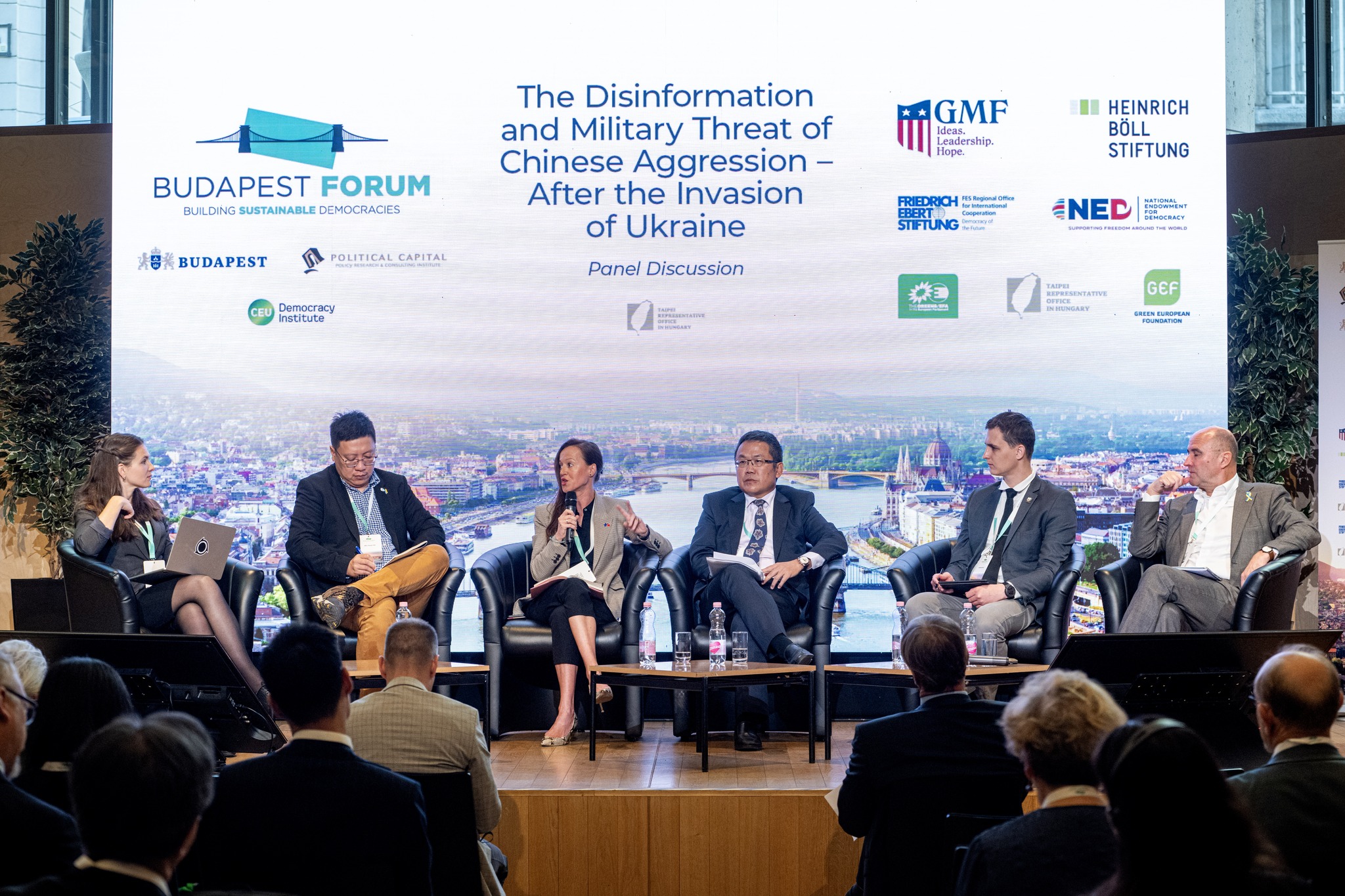Budapest Forum 2023 - The Disinformation and Military Threat of Chinese Aggression – After the Invasion of Ukraine
2023-10-19
Keynote speech
- Lo Ping-cheng, Minister without Portfolio & Spokesperson, Executive Yuan, Taiwan (online)
Speakers
- András Bartók, Assistant Lecturer, University of Public Service
- Zsuzsa Anna Ferenczy, Associate Researcher, Vrije Universiteit Brussel; Assistant Professor, National Dong Hwa University
- Roland Freudenstein, Vice President, GLOBSEC; Head, GLOBSEC Brussels
- Liu Shih-chung, Taiwan Representative to Hungary
- Min Hsuan Wu, Co-founder & CEO, DoubleThinkLab
Moderator: Una Aleksandra Bērziņa-Čerenkova, Head, Riga Stradins University Political Science PhD Program; Director, RSU China Studies Centre

Main takeaways
- Taiwan matters due to its successful democracy, economy, chipmaking industry and strategic position in the Pacific as a large portion of world maritime trade goes through the Taiwan Strait. This was reinforced after Russia’s invasion against Ukraine. Additionally, there is no country that knows better how to deal with Chinese military harassment, provocation, economic coercion and diplomatic operations.
- Beijing’s ultimate goal is to unify with Taiwan, however, its ambitions go well beyond that. They want to break the so-called first island chain built by the US, Japan, Korea Australia and the Philippines, and control the surrounding seas. Thus a Taiwan contingency is also a Japan, Korea, and global contingency. If China launches a war 60% of Taiwanese would fight, and 60% of Americans would approve if the US government would use military measures to assist Taiwan.
- Experts categorize escalation into three categories: 1.) a full-scale invasion, 2.) occupying outlying islands, 3.) blockade without occupation. Current wargames show that in the mid-term, between the three- to five-year period, conventional military steps by China would not necessarily be successful leading to a high rate of failure. However intervening forces – the US and Japan - would suffer a high number of casualties as well.
- Hungarian media is misrepresenting these risks and scenarios, mostly focusing on Western or American casualty ratios, and scenarios when they lost. This risks creating a climate within the public that any sort of military intervention on behalf of Taiwan would be futile. In more realistic scenarios, this could mean that the Hungarian public would be avoidant of sanctions and actions against Chinese aggression.
- Autocrats' main narrative tells us that great powers will always have spheres of influence, people do not want choice but stability, and globally valid human rights are an aberration. They also believe that the 21st century belongs to them. Autocrats support each other financially, technologically and militarily, also using disinformation and economic coercion to undermine democracies.
- The EU is adjusting to this new reality and building up resilience to authoritarian threats by de-risking and creating defensive tools. It will take time as the EU is fragmented. After 2020, Taiwan is finally on the agenda, and there is no turning back.
- Other than the overlap between the narratives and worldviews of Russian and Chinese propaganda, there is evidence for direct cooperation as well. In 2015 Russia Today signed an agreement with the major state media in China and they started to share and translate each other's contents and narratives. This could be seen after the Russian invasion against Ukraine.
- We need to understand the difference between the One China principle and the One China policy, as it has been used by Chinese information operations. According to the One China principle that Beijing imposes is that there's one China and Taiwan is part of China. According to the One China policy that the EU and different democratic countries have, is that they recognize the PRC as the sole legal government of China, but maintain the right to cooperate Taiwan.
Recommendations
- Democrats across the world should support each other and even cooperate with some autocracies as long as they don’t undermine the West’s interests.
- The EU needs to have a strategic vision and a common understanding of China’s global agenda. It needs to work together with like-minded countries not only in Asia but in Africa and Latin America as well. Some sort of economic disengagement also needs to happen between Europe and China.
- The media should be more prepared on Taiwan, China and East Asia in general. Additionally, East Asian countries like Japan should also show that they are actually a strong provider of regional security.
Lo Ping-cheng's keynote speech
Panel discussion
Copyright 2026. Political Capital Policy Research and Consulting Institute, all rights reserved.

